A Portrait of Tragedy (Chapter 2) Read online
Page 2
though a blessing cast over something were hocus-pocus. She ridicules her husband for the way in which he was using his hands, as she goes off on a tangent. Lace decides it would do no good to interject, by reminding his wife about proof given in the Bible, when Daniel and his fellow young Hebrew brethren prayed that the vegetables they ate would provide nourishment, as they fasted from the king’s personal provisions (food known to be involved in ceremonial offerings to idols).
Lace wonders if Judy was placed in his life by God, to try his patience, and to push his trained knowledge toward the development of practical understanding. Sensing the discussion is close to becoming a fueled argument, as Judy finally ends her rant, Lace tries to appease his fuming wife by admitting to her, “I see the passion in your eyes when you vent to me, Darling. Sometimes I can’t help myself, and say things I shouldn’t--knowing it will get a rise out of you.”
His wife stares with malcontent then erupts, “You’re sick, taking pleasure in making me mad. What’s even more disgusting is that the things you say don’t even make any sense.” Turning her head, she wants to walk away. In this horribly small place where can she go?
“Judy, I’m sorry. It was never my intentions to offend you. I had hoped to share things that have been troubling me.” Lace searches for relent in his wife’s scorn-filled eyes. Despite not having a proper meal in months, the idea to pick up the fork and eat something sickens his stomach. “I’ve had seminary in my thoughts lately. I suppose that’s why I brought these topics up now. I’m sorry for insulting you!” After numerous experiences, he understands that it would do no good for him to share the struggles and horrible losses he suffered while away at work.
Detached from concern for her husband, Judy returns focus and tells him, “It was a stressful time when we were in school. I understand, Lace. Let’s just finish our meal together.”
Lace clenches the grain of sand in his palm, knowing his wife has never backed down this easily. Her emotions are as a pressure cooker, disguised and bottled up, sure to explode.
He hopes that the violent image that’s suddenly entered his mind is a farfetched scene created by his imagination, and knows it would be best to dwell on something else.
Forcing himself to eat his salad, Lace reflects on his education. How that knowledge has stuck with him, and wonders why his wife’s become so antagonistic to the same teachings.
He recalls those past days, when looking forward to passing his final examinations.
The curriculum felt like shackles, restraining him from the start of an anticipated career.
Failing to graduate would stunt his growth; he would be viewed as an immature citizen.
The goal of each student is to acquire a certificate to possessions. It’s taught that he who is without the diligence to graduate is irresponsible and unsuitable to manage material riches. Meeting Judy at the start of seminary, Lace observes her struggle to accept inspirational concepts. Initially his sweetheart worked hard for the Messiah, as was the norm for students involved. But he detected a portion of her that was divided, which he struggles with in his life also. It forces the question, is she the right woman for him to spend the rest of his life with?
Held secretly by her is her fear that Lace may not pass his final year of education.
Lace and Judy marry just after their magnificent graduation ceremony.
Only later does it become evident that Judy is a stubborn and self-centered woman.
Wanting only to please his new spouse, Lace relents to Judy’s expressed desire for extravagant indulgences. With the completion of seminary they’re allowed anything in this world that they could hope to own. Lace gives in to the promise of this temptation. The couple acquire what they believe will make them happy, moving in to a mansion with a lavish plot of acreage, and all the grand amenities they could imagine. The only drawback is that the home needs maintenance for the utilities to work, and external renovations for aesthetic appeal.
There’s a waiting list for smaller apartments, built in areas of greater need. The young adults who embrace a selfless mentality move in to these highly sought-after quarters straight from graduation. There are no windows or skylights to offer a view of outside distractions. The housing consists of a common area, a bathroom for personal hygiene, a kitchen for food prep and meal accommodations, cabinet space for eating utensils, and a dresser or closet for clothing.
The couple lives in an era where the effects of death are suppressed. An advanced form of evil, bred in the time of tribulation, is purged when the Savior arrives. Mistakes made by the forefathers are taught for future generations to learn from. Those enslaved during the seven year reign of Satan and his Anti-Christ have either been freed, or judged for their allegiances.
Time is different now that the sun’s energy is replaced by the light from Christ.
During the New Millennium humans are still offered the choice of doing what’s right or wrong, and have the freedom to exercise their own beliefs. The reigning Christ offers marvelous advancements for man to utilize. This also brings about conflict in man’s quest for dominance.
Judy is constantly troubled, considering Lace won’t return from work one of these days.
Though she’s been taught how to thwart the onset of negative emotions, she’s lost faith in the use of this practice. In her heart a dark emptiness dwells. And so she fosters self-reliance, forfeiting her hopes on an outside source for emotional strength. Judy’s fears are destined to transcend deep sorrow (to those born in a world said to be free of sin’s influence over corruption and death) when acting out these emotions toward Lace.
Her husband, on the other hand, is a man who lives to avoid fear. It’s a concept promoted in seminary and emphasized in his ongoing work curriculum. An individual only gains such confidence by faith in the creator of emotion. It is a necessary tool in Lace’s daily work schedule as he enters a hellish era which takes place during the time of great tribulation.
(Click here for the next chapter.)

 Electric Chair
Electric Chair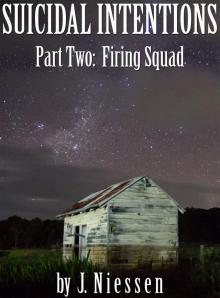 Suicidal Intentions: Firing Squad
Suicidal Intentions: Firing Squad_preview.jpg) Sparkles Adorning Destitution (Revised)
Sparkles Adorning Destitution (Revised)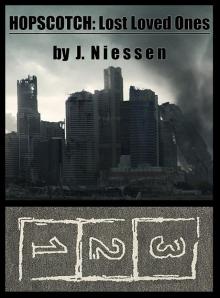 Hopscotch: Lost Loved Ones
Hopscotch: Lost Loved Ones Suicidal Intentions: Lethal Injection
Suicidal Intentions: Lethal Injection_preview.jpg) A Portrait of Tragedy (Chapter 2)
A Portrait of Tragedy (Chapter 2)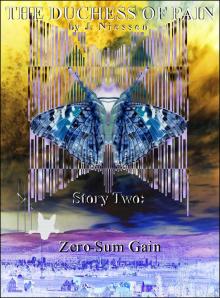 Zero-Sum Gain
Zero-Sum Gain_preview.jpg) A Portrait of Tragedy (Chapter 4)
A Portrait of Tragedy (Chapter 4) Tournament of Trials
Tournament of Trials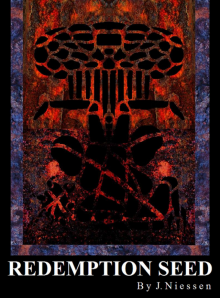 Redemption Seed
Redemption Seed_preview.jpg) A Portrait of Tragedy (Chapter 6)
A Portrait of Tragedy (Chapter 6)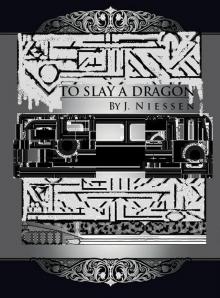 To Slay a Dragon
To Slay a Dragon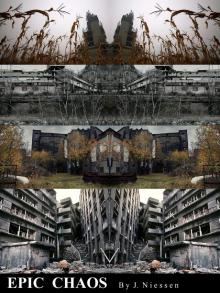 Epic Chaos
Epic Chaos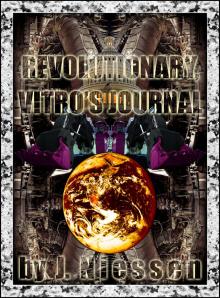 Revolutionary, Vitro’s Journal
Revolutionary, Vitro’s Journal Forsaken Ties
Forsaken Ties